SAL de IBIZA Sea Salt
Salt from Ibiza
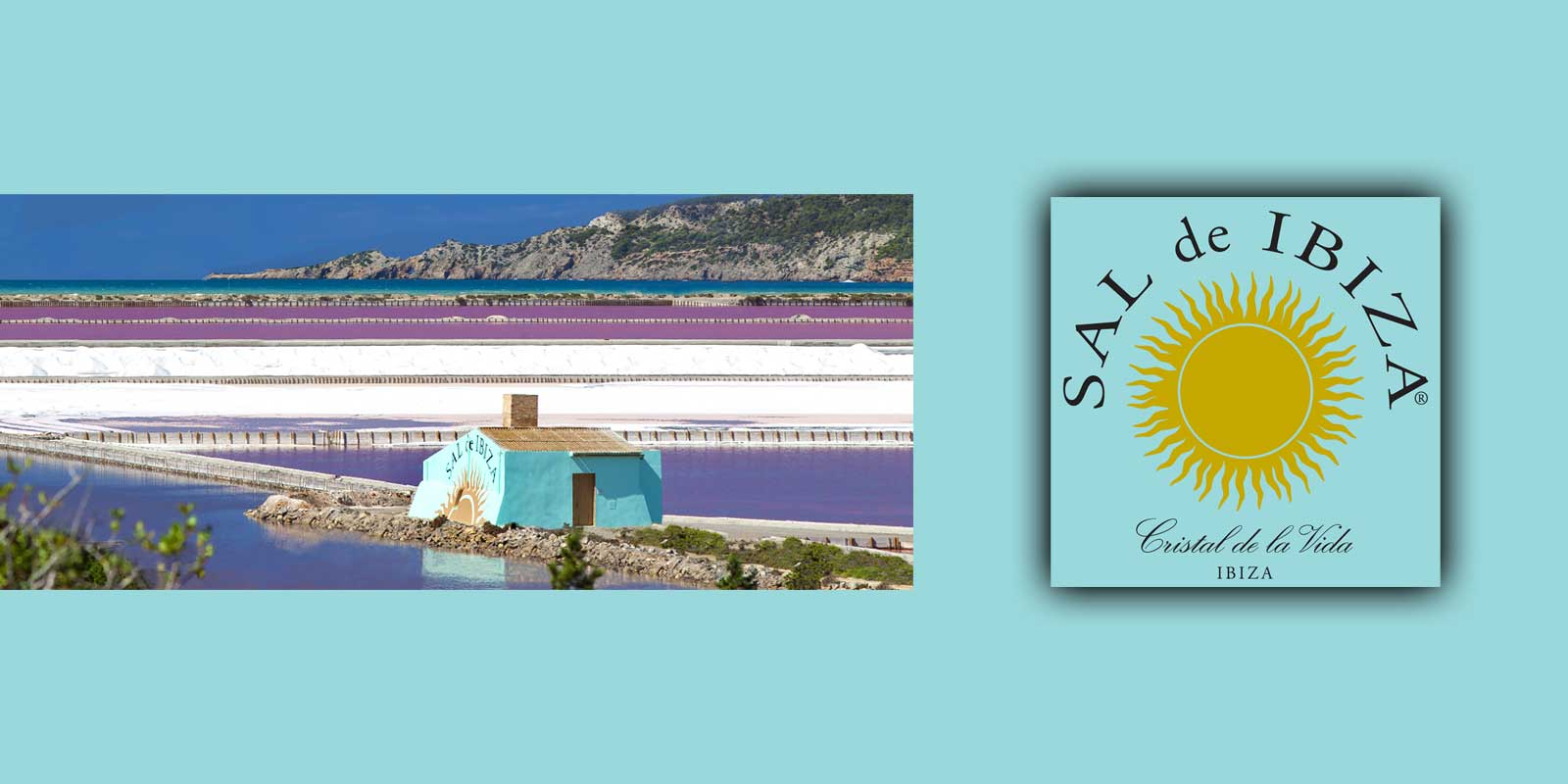

The Fleur de Sel is obtained in the nature reserves of the salt mines of Ibiza. The small, fragile crystals only form when there is a lot of sun, low humidity and constant wind.
Sal de Ibiza - salt from the island
Fleur de Sel
The salt flower grows in the nature reserve where the saltworks is located. The fine crystals on the water surface only form during long periods of sunshine, low humidity and constant wind. They are fine, mild and mineral.
Sal de Ibiza - salt from the island
The harvested sea salt is dried by the sun. It is ground coarsely or finely and has a clear, fruity saltiness that is very subtle. For the salt mill or the pinch from your fingertips.
Granito
This salt is medium coarse and absorbent. Thanks to its mildness, as a seasoning salt with chili, sesame, herbs and much more, no dish will necessarily be oversalted unless the cook is in love.
copyright text: viani.de
Sal de Ibiza - salt from the island of Ibiza
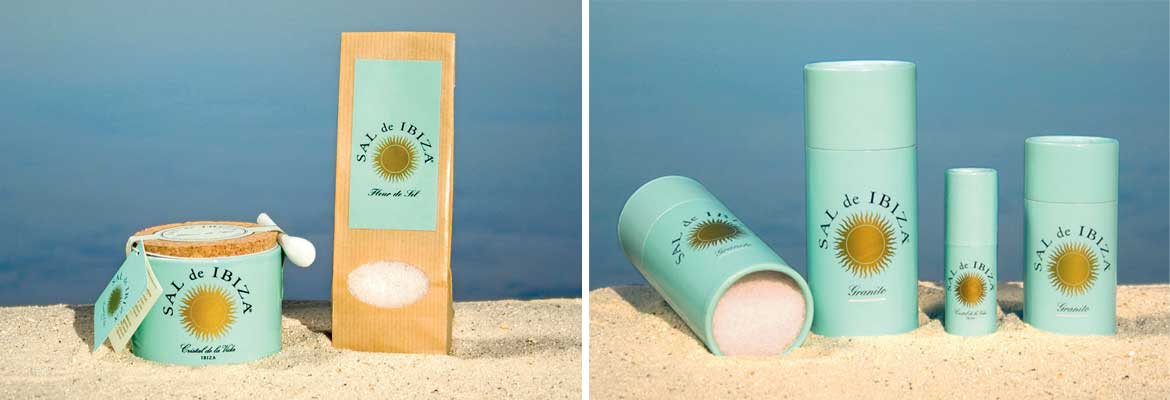
copyright photo: saldeibiza.com
The harvested sea salt is dried by the sun. It is coarsely or finely ground and has a clear, fruity saltiness that is very subtle. For the salt mill or the pinch from your fingertips.
Sal de Ibiza - sea salt from the island of Ibiza
800 BC
The Balearic island of Ibiza was originally colonized by the Phoenicians in the VIIIth century BC. The salt mines there have their origins in just this epoch. The first official reference to the salt pans of Ibiza dates from the time of Punic rule, which dates back to 540 BC. started. Under the influence of the Roman Empire was the management of the salt pans from 122 BC. continued until the demise of the Empire in 476 AD. Then Ibiza was visited by the Vandals and the Byzantines. For almost half a millennium, the island suffered from constantly changing occupiers, until finally in 902 AD. was conquered by the Moors. These essentially took over the Punic-era plants and production methods of salt extraction.
1235 AD
After the reconquest of the island in the course of the Reconquista, the salt pans experienced important technical innovations that significantly improved both the quality of the salt and the productivity of the extraction. Already at that time the salt from Ibiza - converted to today`s conditions - sold around 25,000 tons per year. Salt was a strategic product at that time because it was almost the only means of preserving food. For a long time, Ibiza, with its salt, was a valued business partner of the most powerful republics of the Middle Ages, such as Genoa, Florence and Venice. After the end of the Spanish War of Succession in 1715, the salt pans were placed under the administration of the crown. However, the plants fell noticeably and production fell to only 7,000 tonnes per year.
1871 AD
In 1871, the salt pans were sold to two Mallorcan merchants at a price of around 1.1 million pesetas (about EUR 9.15 million). In 1878 they founded the Fabrica de la Sal de Ibiza, the nucleus of today`s operating company Salinera Espanola SA. In this new, privately-economically organized epoch, large investments were made, which ensured that already in 1888 again 50,000 tons of salt were produced, which would mean a successful year even by today`s standards.
copyright text: saldeibiza.com
Sal de Ibiza - sea salt in light cuisine
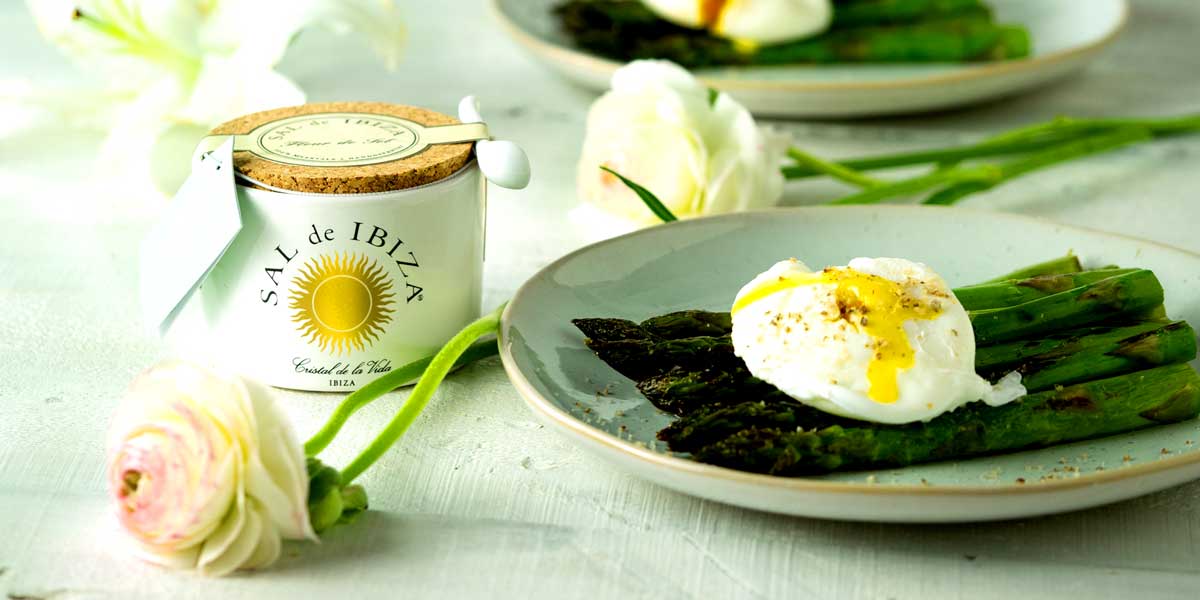
copyright photo: saldeibiza.com
Poached eggs on fried green asparagus and salt from Sal de Ibiza
500 g green asparagus, just cut off the ends
4 pieces of eggs
2-3 tbsp wine
5 tbsp olive oil
2 pinches of SAL de IBIZA Isla Blanca
Heat olive oil in a pan and roast the asparagus for about 10-12 minutes or bake in the oven for about 25 minutes. Add some water and simmer gently. Poach the eggs one at a time without shells in boiling water. When the asparagus has a nice roasted color, distribute it on the plates. Place the poached eggs on the asparagus. Sprinkle with the sea salt from SAL de IBIZA Isla Blanca and ENJOY!
Sal de Ibiza - salt from the island of Ibiza
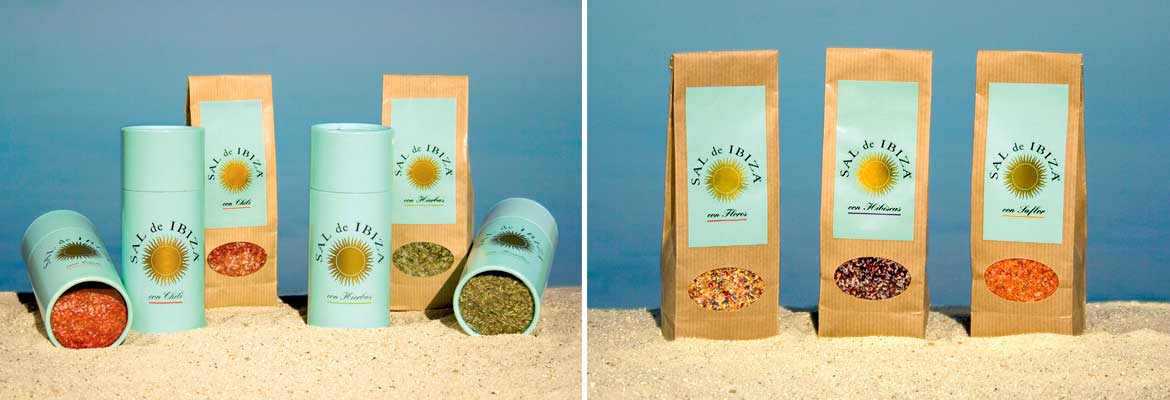
copyright photo: saldeibiza.com
Medium size and receptive is this salt. Thanks to its mildness it is salty necessarily as seasoning salt with chilli, sesame, herbs and more no court, unless the chef is in love.
Sal de Ibiza - salt from the island of Ibiza
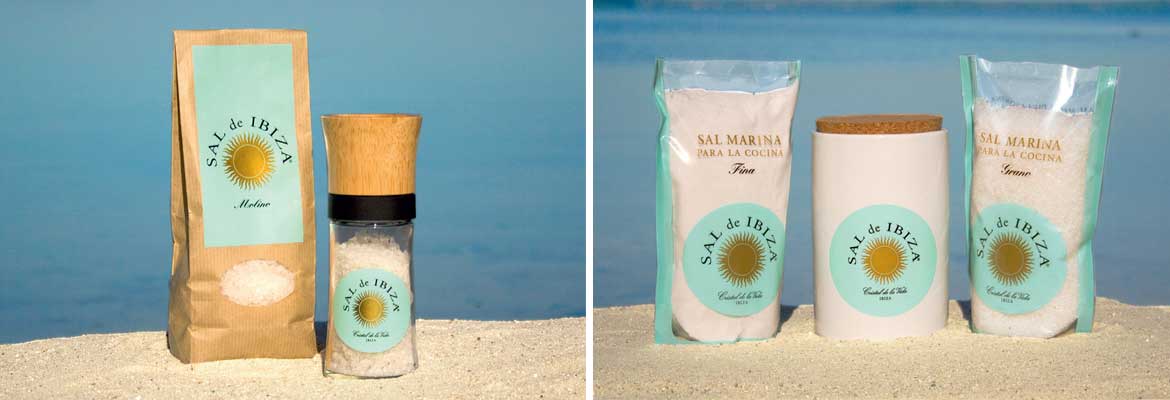
copyright photo: saldeibiza.com
Sal de Ibiza
SAL de IBIZA offers a range of high quality table salt products, all made from 100% natural sea salt. SAL de IBIZA is obtained exclusively in the Parque Natural Natural Reserve of Ses Salines d Eivissa. It contains no additives or preservatives, it is also subjected to no further refining processes, except gentle drying in sunlight and gentle grinding in ancient stone mills. For these reasons, SAL de IBIZA contains over 80 minerals and trace elements that are detectable in seawater and vital for the human body.
copyright text: saldeibiza.com
-

Fleur de Sel, in a ceramic pot with measuring spoon, Sal de Ibiza
150 g € 14,89 * (€ 99,27 / kg)
NOW AVAILABLE NOW AVAILABLE Delivery of the goods within 36 hours of order and successful payment. Please also note the information on payment and shipping.item number: 20591
NOW AVAILABLE Delivery of the goods within 36 hours of order and successful payment. Please also note the information on payment and shipping.item number: 20591 -
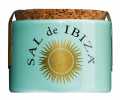
Fleur de Sel Azafran mini, Fleur de Sel with saffron in a mini pot, Sal de Ibiza
28.35 g € 11,19 * (€ 394,71 / kg)
NOW AVAILABLE NOW AVAILABLE Delivery of the goods within 36 hours of order and successful payment. Please also note the information on payment and shipping.item number: 33269
NOW AVAILABLE Delivery of the goods within 36 hours of order and successful payment. Please also note the information on payment and shipping.item number: 33269 -
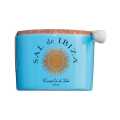
Fleur de Sel - Mar Blue, Fleur de Sel with black garlic, organic
140 g € 19,48 * (€ 139,14 / kg)
NOW AVAILABLE NOW AVAILABLE Delivery of the goods within 36 hours of order and successful payment. Please also note the information on payment and shipping.item number: 34004
NOW AVAILABLE Delivery of the goods within 36 hours of order and successful payment. Please also note the information on payment and shipping.item number: 34004
-

Granito to go, mini shaker, sea salt in a handbag shaker, Sal de Ibiza
31.1 g € 5,07 * (€ 163,02 / kg)
NOW AVAILABLE NOW AVAILABLE Delivery of the goods within 36 hours of order and successful payment. Please also note the information on payment and shipping.item number: 20601125 g € 6,38 * (€ 51,04 / kg)
NOW AVAILABLE Delivery of the goods within 36 hours of order and successful payment. Please also note the information on payment and shipping.item number: 20601125 g € 6,38 * (€ 51,04 / kg)
NOW AVAILABLE NOW AVAILABLE Delivery of the goods within 36 hours of order and successful payment. Please also note the information on payment and shipping.item number: 20600250 g € 8,59 * (€ 34,36 / kg)
NOW AVAILABLE Delivery of the goods within 36 hours of order and successful payment. Please also note the information on payment and shipping.item number: 20600250 g € 8,59 * (€ 34,36 / kg)
NOW AVAILABLE NOW AVAILABLE Delivery of the goods within 36 hours of order and successful payment. Please also note the information on payment and shipping.item number: 20599
NOW AVAILABLE Delivery of the goods within 36 hours of order and successful payment. Please also note the information on payment and shipping.item number: 20599 -

Granito con Hierbas, jewelry shaker, sea salt with herbs, Sal de Ibiza
55 g € 9,46 * (€ 172,00 / kg)
NOW AVAILABLE NOW AVAILABLE Delivery of the goods within 36 hours of order and successful payment. Please also note the information on payment and shipping.item number: 20602
NOW AVAILABLE Delivery of the goods within 36 hours of order and successful payment. Please also note the information on payment and shipping.item number: 20602 -

Granito Citronela + Jengibre, jewelry shaker, sea salt with lemongrass + ginger, Sal de Ibiza
100 g € 9,46 * (€ 94,60 / kg)
NOW AVAILABLE NOW AVAILABLE Delivery of the goods within 36 hours of order and successful payment. Please also note the information on payment and shipping.item number: 20604
NOW AVAILABLE Delivery of the goods within 36 hours of order and successful payment. Please also note the information on payment and shipping.item number: 20604 -

Granito Pimienta Verde + Limon, jewelry shaker, sea salt with green pepper + lemon, Sal de Ibiza
85 g € 9,46 * (€ 111,29 / kg)
NOW AVAILABLE NOW AVAILABLE Delivery of the goods within 36 hours of order and successful payment. Please also note the information on payment and shipping.item number: 20605
NOW AVAILABLE Delivery of the goods within 36 hours of order and successful payment. Please also note the information on payment and shipping.item number: 20605 -

Granito Smoky BBQ, jewelry shaker, sea salt with Smoky BBQ, Sal de Ibiza
70 g € 9,46 * (€ 135,14 / kg)
NOW AVAILABLE NOW AVAILABLE Delivery of the goods within 36 hours of order and successful payment. Please also note the information on payment and shipping.item number: 20606
NOW AVAILABLE Delivery of the goods within 36 hours of order and successful payment. Please also note the information on payment and shipping.item number: 20606 -

Granito Spicy Cajun, jewelry shaker, sea salt with Spicy Cajun, Sal de Ibiza
75 g € 9,46 * (€ 126,13 / kg)
NOW AVAILABLE NOW AVAILABLE Delivery of the goods within 36 hours of order and successful payment. Please also note the information on payment and shipping.item number: 20607
NOW AVAILABLE Delivery of the goods within 36 hours of order and successful payment. Please also note the information on payment and shipping.item number: 20607 -

Granito con chili, jewelry shaker, sea salt with chilli, Sal de Ibiza
75 g € 9,46 * (€ 126,13 / kg)
NOW AVAILABLE NOW AVAILABLE Delivery of the goods within 36 hours of order and successful payment. Please also note the information on payment and shipping.item number: 20608
NOW AVAILABLE Delivery of the goods within 36 hours of order and successful payment. Please also note the information on payment and shipping.item number: 20608 -

Granito Gomasio, jewelry shaker, sea salt with Gomasio, Sal de Ibiza
75 g € 9,46 * (€ 126,13 / kg)
NOW AVAILABLE NOW AVAILABLE Delivery of the goods within 36 hours of order and successful payment. Please also note the information on payment and shipping.item number: 20610
NOW AVAILABLE Delivery of the goods within 36 hours of order and successful payment. Please also note the information on payment and shipping.item number: 20610 -

Granito con Hibiscus, jewelry shaker, sea salt with hibiscus, Sal de Ibiza
90 g € 9,46 * (€ 105,11 / kg)
NOW AVAILABLE NOW AVAILABLE Delivery of the goods within 36 hours of order and successful payment. Please also note the information on payment and shipping.item number: 20613
NOW AVAILABLE Delivery of the goods within 36 hours of order and successful payment. Please also note the information on payment and shipping.item number: 20613 -

Granito, Ceramic Bundle Edition, Salt and Organic Pepper in a Ceramic Shaker, Set, Sal de Ibiza
90 g / 40 g € 22,04 * (€ 244,89 / kg)
NOW AVAILABLE NOW AVAILABLE Delivery of the goods within 36 hours of order and successful payment. Please also note the information on payment and shipping.item number: 33270
NOW AVAILABLE Delivery of the goods within 36 hours of order and successful payment. Please also note the information on payment and shipping.item number: 33270
-

Granito Bundle, Beach Chair Edit., Pure and Hibiscus, Pure Sea Salt and Sea Salt with Hibiscus, Set, Sal de Ibiza
125g/90g € 12,93 * (€ 103,44 / kg)
NOW AVAILABLE NOW AVAILABLE Delivery of the goods within 36 hours of order and successful payment. Please also note the information on payment and shipping.item number: 39018
NOW AVAILABLE Delivery of the goods within 36 hours of order and successful payment. Please also note the information on payment and shipping.item number: 39018 -

Creamy White Chocolate 38% a la flor de sal, Organic, White Chocolate 38% with Fleur de Sel, Organic, Sal de Ibiza
80g € 7,37 * (€ 92,13 / kg)
NOW AVAILABLE NOW AVAILABLE Delivery of the goods within 36 hours of order and successful payment. Please also note the information on payment and shipping.item number: 33972
NOW AVAILABLE Delivery of the goods within 36 hours of order and successful payment. Please also note the information on payment and shipping.item number: 33972
-

Almendras - Flowered Almonds, almonds with flower salt, sachet, Sal de Ibiza
80 g € 6,84 * (€ 85,50 / kg)
NOW AVAILABLE NOW AVAILABLE Delivery of the goods within 36 hours of order and successful payment. Please also note the information on payment and shipping.item number: 27827
NOW AVAILABLE Delivery of the goods within 36 hours of order and successful payment. Please also note the information on payment and shipping.item number: 27827 -

Cacahuetes - Smoky Barbeque, peanuts with Smoky BBQ, bags, Sal de Ibiza
80 g € 4,53 * (€ 56,63 / kg)
NOW AVAILABLE NOW AVAILABLE Delivery of the goods within 36 hours of order and successful payment. Please also note the information on payment and shipping.item number: 27829
NOW AVAILABLE Delivery of the goods within 36 hours of order and successful payment. Please also note the information on payment and shipping.item number: 27829 -

Mix de Luxe Flor de Sal, luxury student food with Flor de Sal, bags, Sal de Ibiza
80 g € 5,45 * (€ 68,13 / kg)
NOW AVAILABLE NOW AVAILABLE Delivery of the goods within 36 hours of order and successful payment. Please also note the information on payment and shipping.item number: 27830
NOW AVAILABLE Delivery of the goods within 36 hours of order and successful payment. Please also note the information on payment and shipping.item number: 27830 -

Fleur de Sel mini, Fleur de Sel in mini pots, Sal de Ibiza
28.5 g € 10,33 * (€ 362,46 / kg)
NOT AVAILABLE Currently not available. When this product will be available is not known. Please also note the information on payment and shipping.item number: 20593
Currently not available. When this product will be available is not known. Please also note the information on payment and shipping.item number: 20593 -

Salt mill filled with coarse sea salt, salt mill filled with coarse sea salt, Sal de Ibiza
110 g € 25,45 * (€ 231,36 / kg)
NOW AVAILABLE NOW AVAILABLE Delivery of the goods within 36 hours of order and successful payment. Please also note the information on payment and shipping.item number: 20595
NOW AVAILABLE Delivery of the goods within 36 hours of order and successful payment. Please also note the information on payment and shipping.item number: 20595 -

Ceramic pot Sal de Ibiza, empty, liter jar, Sal de Ibiza
Piece € 28,30 * (€ 28,30 / piece)
NOW AVAILABLE NOW AVAILABLE Delivery of the goods within 36 hours of order and successful payment. Please also note the information on payment and shipping.item number: 20596
NOW AVAILABLE Delivery of the goods within 36 hours of order and successful payment. Please also note the information on payment and shipping.item number: 20596 -

Granito con Flores, jewelry shaker, sea salt with flower mixture, Sal de Ibiza
75 g € 9,46 * (€ 126,13 / kg)
NOW AVAILABLE NOW AVAILABLE Delivery of the goods within 36 hours of order and successful payment. Please also note the information on payment and shipping.item number: 20611
NOW AVAILABLE Delivery of the goods within 36 hours of order and successful payment. Please also note the information on payment and shipping.item number: 20611 -

Anacardos - Spicy Cajun, Cashews with Spicy Cajun, sachets, Sal de Ibiza
80 g € 5,81 * (€ 72,63 / kg)
NOW AVAILABLE NOW AVAILABLE Delivery of the goods within 36 hours of order and successful payment. Please also note the information on payment and shipping.item number: 27828
NOW AVAILABLE Delivery of the goods within 36 hours of order and successful payment. Please also note the information on payment and shipping.item number: 27828 -

Wine cooler, wine cooler, Sal de Ibiza
1 piece € 28,30 * (€ 28,30 / piece)
NOW AVAILABLE NOW AVAILABLE Delivery of the goods within 36 hours of order and successful payment. Please also note the information on payment and shipping.item number: 33968
NOW AVAILABLE Delivery of the goods within 36 hours of order and successful payment. Please also note the information on payment and shipping.item number: 33968 -

Granito Bundle, Beach Chair Edit., Pure and Hierbas, Pure Sea Salt and Sea Salt with Medit. Herbs, Set, Sal de Ibiza
125g/55g € 12,93 * (€ 103,44 / kg)
NOW AVAILABLE NOW AVAILABLE Delivery of the goods within 36 hours of order and successful payment. Please also note the information on payment and shipping.item number: 39019
NOW AVAILABLE Delivery of the goods within 36 hours of order and successful payment. Please also note the information on payment and shipping.item number: 39019 -

Almendras - White Truffle Almonds, Almonds with truffle flavor, Sal de Ibiza
80 g € 8,59 * (€ 107,38 / kg)
NOW AVAILABLE NOW AVAILABLE Delivery of the goods within 36 hours of order and successful payment. Please also note the information on payment and shipping.item number: 41221
NOW AVAILABLE Delivery of the goods within 36 hours of order and successful payment. Please also note the information on payment and shipping.item number: 41221 -

Macadamia on Fire, macadamia nuts with chilli, Sal de Ibiza
80 g € 8,59 * (€ 107,38 / kg)
NOW AVAILABLE NOW AVAILABLE Delivery of the goods within 36 hours of order and successful payment. Please also note the information on payment and shipping.item number: 41222
NOW AVAILABLE Delivery of the goods within 36 hours of order and successful payment. Please also note the information on payment and shipping.item number: 41222 -

Chips Smoky Paprika, potato chips with smoked paprika, Sal de Ibiza
125 g € 5,81 * (€ 46,48 / kg)
NOW AVAILABLE NOW AVAILABLE Delivery of the goods within 36 hours of order and successful payment. Please also note the information on payment and shipping.item number: 41223
NOW AVAILABLE Delivery of the goods within 36 hours of order and successful payment. Please also note the information on payment and shipping.item number: 41223 -

Granito Bundle, Pure and Citronella + Ginger, Pure Sea Salt and Sea Salt with Citrus Grass + Ginger, Set, Sal de Ibiza
125 g / 100 g € 12,93 * (€ 57,47 / kg)
NOW AVAILABLE NOW AVAILABLE Delivery of the goods within 36 hours of order and successful payment. Please also note the information on payment and shipping.item number: 41292
NOW AVAILABLE Delivery of the goods within 36 hours of order and successful payment. Please also note the information on payment and shipping.item number: 41292 -

Granito Bundle, Beach Chair Edit., Pure and Flores, Pure Sea Salt and Sea Salt with Flowers, Set, Sal de Ibiza
125 g / 75 g € 12,93 * (€ 64,65 / kg)
NOW AVAILABLE NOW AVAILABLE Delivery of the goods within 36 hours of order and successful payment. Please also note the information on payment and shipping.item number: 41293
NOW AVAILABLE Delivery of the goods within 36 hours of order and successful payment. Please also note the information on payment and shipping.item number: 41293 -

Granito Bundle, Beach Chair Edit., Pure and Chili, Pure Sea Salt and Sea Salt with Chili, Set, Sal de Ibiza
125 g / 75 g € 12,93 * (€ 64,65 / kg)
NOW AVAILABLE NOW AVAILABLE Delivery of the goods within 36 hours of order and successful payment. Please also note the information on payment and shipping.item number: 41294
NOW AVAILABLE Delivery of the goods within 36 hours of order and successful payment. Please also note the information on payment and shipping.item number: 41294 -

Tartufi dolci Flor de Sal e Caramello Salato, Praline with white chocolate and salted caramel, Sal de Ibiza
1,000 g € 56,91 * (€ 56,91 / kg)
NOW AVAILABLE NOW AVAILABLE Delivery of the goods within 36 hours of order and successful payment. Please also note the information on payment and shipping.item number: 41375
NOW AVAILABLE Delivery of the goods within 36 hours of order and successful payment. Please also note the information on payment and shipping.item number: 41375 -

Tartufi dolci Flor de Sal e Caramello Salato, Praline with white chocolate and salted caramel, Sal de Ibiza
200 g € 14,38 * (€ 71,90 / kg)
NOW AVAILABLE NOW AVAILABLE Delivery of the goods within 36 hours of order and successful payment. Please also note the information on payment and shipping.item number: 41376
NOW AVAILABLE Delivery of the goods within 36 hours of order and successful payment. Please also note the information on payment and shipping.item number: 41376 -

Tartufi dolci extranero al Flor de Sal, dark chocolate truffles extra bitter with salt, Sal de Ibiza
1,000 g € 56,91 * (€ 56,91 / kg)
NOW AVAILABLE NOW AVAILABLE Delivery of the goods within 36 hours of order and successful payment. Please also note the information on payment and shipping.item number: 41377
NOW AVAILABLE Delivery of the goods within 36 hours of order and successful payment. Please also note the information on payment and shipping.item number: 41377 -

Tartufi dolci extranero al Flor de Sal, dark chocolate truffles extra bitter with salt, Sal de Ibiza
200 g € 14,38 * (€ 71,90 / kg)
NOW AVAILABLE NOW AVAILABLE Delivery of the goods within 36 hours of order and successful payment. Please also note the information on payment and shipping.item number: 41378
NOW AVAILABLE Delivery of the goods within 36 hours of order and successful payment. Please also note the information on payment and shipping.item number: 41378 -

Ceramic bowl large, Sal de Ibiza, empty, ceramic bowl, large, Sal de Ibiza
17.6 x 17.6 x 4.6 cm € 23,56 * (€ 23,56 / piece)
NOW AVAILABLE NOW AVAILABLE Delivery of the goods within 36 hours of order and successful payment. Please also note the information on payment and shipping.item number: 41409
NOW AVAILABLE Delivery of the goods within 36 hours of order and successful payment. Please also note the information on payment and shipping.item number: 41409 -

Ceramic bowl medium, Sal de Ibiza, empty, ceramic bowl, medium, Sal de Ibiza
13.3 x 13.3 x 4.3 cm € 15,34 * (€ 15,34 / piece)
NOW AVAILABLE NOW AVAILABLE Delivery of the goods within 36 hours of order and successful payment. Please also note the information on payment and shipping.item number: 41410
NOW AVAILABLE Delivery of the goods within 36 hours of order and successful payment. Please also note the information on payment and shipping.item number: 41410 -

Ceramic bowl small, Sal de Ibiza, empty, ceramic bowl, small, Sal de Ibiza
9.6 x 9.6 x 3.1 cm € 9,56 * (€ 9,56 / piece)
NOW AVAILABLE NOW AVAILABLE Delivery of the goods within 36 hours of order and successful payment. Please also note the information on payment and shipping.item number: 41411
NOW AVAILABLE Delivery of the goods within 36 hours of order and successful payment. Please also note the information on payment and shipping.item number: 41411 -

Fleur de Sel, Refill, Refill pack, Sal de Ibiza
150 g € 8,59 * (€ 57,27 / kg)
NOW AVAILABLE NOW AVAILABLE Delivery of the goods within 36 hours of order and successful payment. Please also note the information on payment and shipping.item number: 20592
NOW AVAILABLE Delivery of the goods within 36 hours of order and successful payment. Please also note the information on payment and shipping.item number: 20592 -

Sal Marina Fina, fine sea salt in a transparent bag, Sal de Ibiza
1.000 g € 7,37 * (€ 7,37 / kg)
NOW AVAILABLE NOW AVAILABLE Delivery of the goods within 36 hours of order and successful payment. Please also note the information on payment and shipping.item number: 20597
NOW AVAILABLE Delivery of the goods within 36 hours of order and successful payment. Please also note the information on payment and shipping.item number: 20597 -

Sal Marina Grano, coarse sea salt in a transparent bag, Sal de Ibiza
1.000 g € 7,37 * (€ 7,37 / kg)
NOW AVAILABLE NOW AVAILABLE Delivery of the goods within 36 hours of order and successful payment. Please also note the information on payment and shipping.item number: 20598
NOW AVAILABLE Delivery of the goods within 36 hours of order and successful payment. Please also note the information on payment and shipping.item number: 20598 -

Fleur de Sel - Isla blanca, Fleur de Sel with Ibizan herbs, Sal de Ibiza
140 g € 19,48 * (€ 139,14 / kg)
NOT AVAILABLE Currently not available. When this product will be available is not known. Please also note the information on payment and shipping.item number: 34005
Currently not available. When this product will be available is not known. Please also note the information on payment and shipping.item number: 34005 -
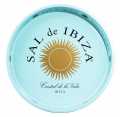
Waiter`s tray, waiter`s tray, sheet metal, Sal de Ibiza
Diameter: 33cm € 28,30 * (€ 28,30 / piece)
NOW AVAILABLE NOW AVAILABLE Delivery of the goods within 36 hours of order and successful payment. Please also note the information on payment and shipping.item number: 35940
NOW AVAILABLE Delivery of the goods within 36 hours of order and successful payment. Please also note the information on payment and shipping.item number: 35940 -

Fleur de Sel Feliz Navidad Limited Edition, Fleur de Sel with winter spices, Sal de Ibiza
140g € 19,48 * (€ 139,14 / kg)
NOW AVAILABLE NOW AVAILABLE Delivery of the goods within 36 hours of order and successful payment. Please also note the information on payment and shipping.item number: 39017
NOW AVAILABLE Delivery of the goods within 36 hours of order and successful payment. Please also note the information on payment and shipping.item number: 39017







